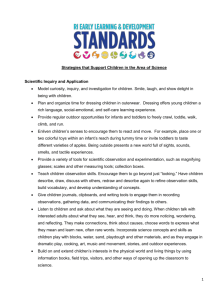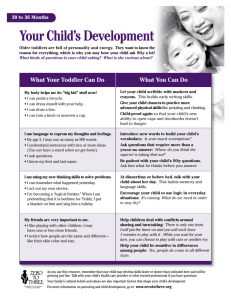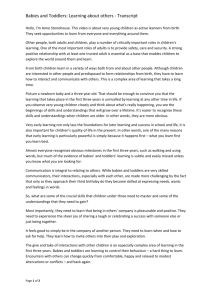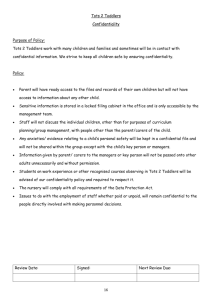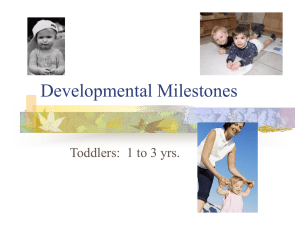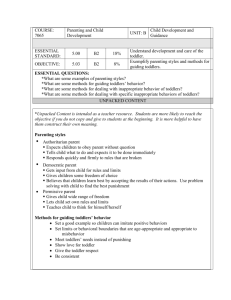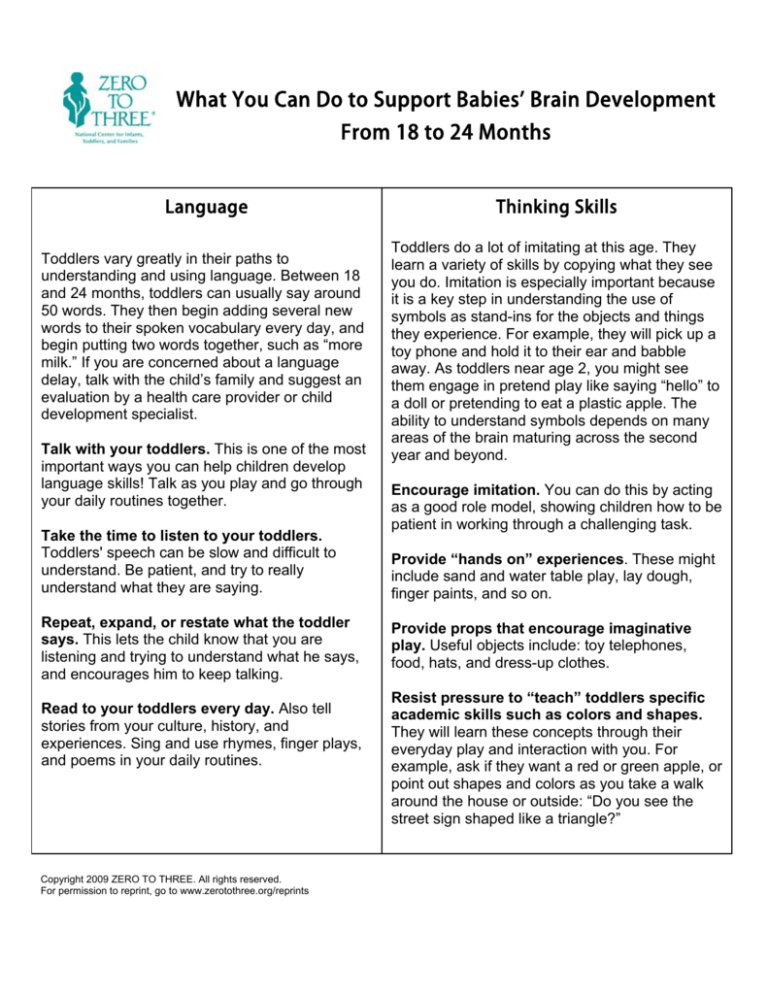
What You Can Do to Support Babies' Brain Development
From 18 to 24 Months
Language
Toddlers vary greatly in their paths to
understanding and using language. Between 18
and 24 months, toddlers can usually say around
50 words. They then begin adding several new
words to their spoken vocabulary every day, and
begin putting two words together, such as “more
milk.” If you are concerned about a language
delay, talk with the child’s family and suggest an
evaluation by a health care provider or child
development specialist.
Talk with your toddlers. This is one of the most
important ways you can help children develop
language skills! Talk as you play and go through
your daily routines together.
Take the time to listen to your toddlers.
Toddlers' speech can be slow and difficult to
understand. Be patient, and try to really
understand what they are saying.
Repeat, expand, or restate what the toddler
says. This lets the child know that you are
listening and trying to understand what he says,
and encourages him to keep talking.
Read to your toddlers every day. Also tell
stories from your culture, history, and
experiences. Sing and use rhymes, finger plays,
and poems in your daily routines.
Copyright 2009 ZERO TO THREE. All rights reserved.
For permission to reprint, go to www.zerotothree.org/reprints
Thinking Skills
Toddlers do a lot of imitating at this age. They
learn a variety of skills by copying what they see
you do. Imitation is especially important because
it is a key step in understanding the use of
symbols as stand-ins for the objects and things
they experience. For example, they will pick up a
toy phone and hold it to their ear and babble
away. As toddlers near age 2, you might see
them engage in pretend play like saying “hello” to
a doll or pretending to eat a plastic apple. The
ability to understand symbols depends on many
areas of the brain maturing across the second
year and beyond.
Encourage imitation. You can do this by acting
as a good role model, showing children how to be
patient in working through a challenging task.
Provide “hands on” experiences. These might
include sand and water table play, lay dough,
finger paints, and so on.
Provide props that encourage imaginative
play. Useful objects include: toy telephones,
food, hats, and dress-up clothes.
Resist pressure to “teach” toddlers specific
academic skills such as colors and shapes.
They will learn these concepts through their
everyday play and interaction with you. For
example, ask if they want a red or green apple, or
point out shapes and colors as you take a walk
around the house or outside: “Do you see the
street sign shaped like a triangle?”
What You Can Do to Support Babies' Brain Development
From 18 to 24 Months
Social-Emotional Development
At about 18 months, toddlers begin developing self-awareness, or an
understanding that they are separate individuals. That’s why the proclamations
“me” and “mine” are all the rage at this age. Toddlers are experiencing a need for
more independence now that they can do more for themselves. Their capacity for
self-control is just beginning to develop during this period. Although toddlers
probably understand you when you tell them not to take from others, they have a
very difficult time stopping themselves from doing it. For all of these reasons,
learning to share and cooperate at this age is still challenging for toddlers. They
need your help and guidance to manage their emotions and to make good
choices.
Have age-appropriate expectations for sharing. If possible, provide multiples
of children’s favorite toys (such as trains) to reduce sharing conflicts. Help the
children take turns. Use a timer so the children can see when it will be their turn
and to help them learn to wait.
Play sharing and turn-taking games. Interesting games for toddlers include
rolling a ball back and forth to each other and taking turns adding a block to the
tower.
Use distraction or redirection to calm or avoid disputes. Offer the child who
needs to wait another activity to engage in.
Copyright 2009 ZERO TO THREE. All rights reserved.
For permission to reprint, go to www.zerotothree.org/reprints
What You Can Do to Support Babies' Brain Development
From 18 to 24 Months
Movement
Toddlers are making great strides in using both their fine motor (fingers and hands) and their
large motor (arms and legs) skills during this time. When toddlers use objects such as pencils
and crayons, they are practicing their fine motor skills. To develop their large motor skills,
toddlers need the freedom to move about indoors and outdoors. This allows them to explore
their surroundings, improve their coordination, and develop new physical skills such as
running, jumping, and climbing.
To Promote Fine Motor Skills
Offer opportunities to draw, paint, or write. Toddlers can do this with markers, pencils, or
crayons.
Provide toys and materials that require the use of fingers and hands. Good items
include crayons, dolls and doll clothes, nesting toys, puzzles, and play dough. Toddlers can
snap together blocks; string chunky beads; and play with small blocks, small toy figures, and
toy cars.
Encourage children to help with dressing and to use a spoon and fork. These
experiences build fine motor skills.
Provide opportunities to grasp, hold, pour, scoop, and squeeze. Sand and water table
play is one way to allow for these experiences.
Encourage toddlers to turn the pages of books as you read with them. Chunky board
books are still best to use with this age group to avoid ripping pages.
To Promote Large Motor Skills
Provide plenty of opportunities to walk, run, climb, and explore-- both indoors and
outdoors.
Create a soft, safe indoor play area. You can do this using pillows, mats, and mattresses.
Have toddlers build forts and other indoor play structures. Provide large blocks and
blankets to help them do this.
Make safe obstacle courses. If safe challenges are not provided, toddlers will often find or
create their own that might not be safe.
Copyright 2009 ZERO TO THREE. All rights reserved.
For permission to reprint, go to www.zerotothree.org/reprints



